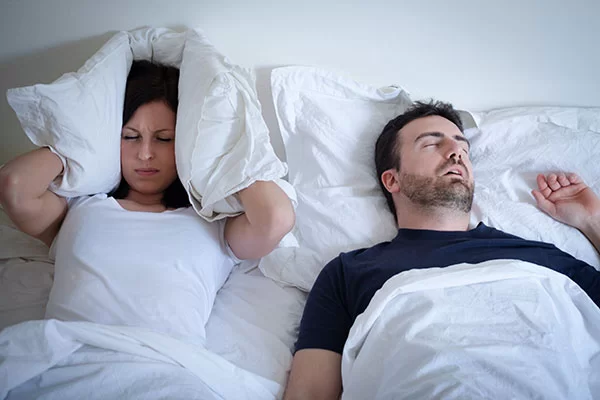Surgery for Sleep Apnea in Green Bay, WI
Please note: We may not offer this treatment at our office. Call (920) 339-8980 to learn more or schedule a sleep apnea consultation.
Sleep Apnea Surgery May Help Restore Your Restful Nights
Sleep apnea is a serious sleep disorder that causes repeated pauses in breathing while you sleep. Many patients first notice loud snoring, frequent waking, or feeling unrested in the morning. Left untreated, sleep apnea can increase the risk of high blood pressure, stroke, heart attacks, heart failure, and depression. It can also affect day-to-day life by causing daytime fatigue, trouble concentrating, and irritability.
Conservative treatments like CPAP therapy (continuous positive airway pressure) or oral appliance therapy are often the first steps in treating sleep apnea. But when CPAP machines or oral appliances don’t provide relief—or when soft tissues in the throat, tongue, or nose block the upper airway—surgery may be recommended.
If you’re searching for sleep apnea treatment near you in Green Bay, our dental team can help you explore whether surgery may be an option. Call our Green Bay dental clinic today at (920) 339-8980 to schedule your appointment. Dr. Daniel Fama and Dr. Kyle Whiteside proudly serve patients in Allouez, Abrams, Denmark, Casco, Seymour, and surrounding communities.
Types of Sleep Apnea
Sleep apnea affects both children and adults, though it’s more common in middle-aged men and women. The three main types include:
- Obstructive Sleep Apnea (OSA): The most common type, caused when throat muscles and other soft tissues collapse and block airflow during sleep.
- Central Sleep Apnea (CSA): Occurs when the brain fails to send proper signals to the breathing muscles.
- Mixed/Complex Sleep Apnea: A combination of obstructive and central sleep apnea.
Most patients who undergo surgery have severe obstructive sleep apnea. A thorough evaluation with a sleep doctor or dentist in Green Bay will help determine the best treatment plan.
Types of Sleep Apnea Surgery
While surgery is often a last-resort treatment, it can help patients who have struggled with other options. Common surgical procedures for sleep apnea include:
- Uvulopalatopharyngoplasty (UPPP): Removes excess soft tissue in the throat, uvula, and soft palate to widen the airway.
- Genioglossus Advancement (GA): Moves the base of the tongue forward so it no longer blocks the throat during sleep.
- Maxillomandibular Advancement (MMA): Adjusts the lower jaw and upper jaw to expand the airway.
- Inspire Therapy (Hypoglossal Nerve Stimulation): An implanted device that stimulates the tongue muscles to keep the airway open.
- Palatal Implants: Stiffen the soft palate to reduce snoring and airway collapse.
- Septoplasty and Turbinate Reduction: Corrects nasal blockages, such as a deviated septum or enlarged turbinates.
Who Is a Candidate for Sleep Apnea Surgery?
Surgery may be recommended if:
- You’ve been diagnosed with moderate to severe obstructive sleep apnea.
- You’re unable to tolerate a CPAP machine or oral appliance.
- You have blocked nasal passages or other structural issues.
- You’re committed to lifestyle changes (healthy weight, avoiding alcohol/sedatives, sleep hygiene).
- A doctor or dentist in Green Bay recommends surgery after a thorough evaluation.
Benefits of Sleep Apnea Surgery
Patients who have undergone sleep apnea surgery often experience:
- Better sleep quality and fewer interruptions in breathing.
- Reduced snoring, improving sleep for both patients and their partners.
- More daytime energy, focus, and productivity.
- Lower cardiovascular risks such as high blood pressure, stroke, and heart disease.
- Less dependence on CPAP therapy for many patients.
- Improved quality of life and overall well-being.
The Sleep Apnea Surgery Process
Most sleep apnea surgeries will be performed under general anesthesia in a hospital or surgical center. The details of your surgery will be dependent upon the type of procedure you’re undergoing. However, most have the same goal of resolving airway obstruction.
Make sure you do the following to ensure a smooth recovery:
- Post-Operative Pain Management: Your surgeon will prescribe pain medications to manage discomfort during the initial recovery period.
- Dietary and Activity Guidelines: Follow dietary recommendations and avoid strenuous activities as directed by your surgeon.
- Follow-up Appointments and Monitoring: Attend postoperative appointments to ensure proper healing and address any concerns.
- Lifestyle Adjustments: Implement lifestyle changes such as maintaining a healthy weight, avoiding alcohol and sedatives, and practicing good sleep hygiene to maximize the benefits of surgery.
Recovery After Sleep Apnea Surgery
Most sleep apnea surgeries are performed under general anesthesia. Recovery time varies, but many patients return to normal routines within three to four weeks. To ensure smooth healing, your surgeon may recommend:
- Pain management with prescribed medication.
- Following dietary and activity restrictions.
- Attending follow-up appointments.
- Maintaining healthy lifestyle habits to prevent recurrence.
Potential Risks and Complications of Sleep Apnea Surgery
As with any surgery, there are potential risks, including:
- Infection
- Bleeding
- Voice changes
- Swelling and discomfort
- Variable success rates depending on severity and patient health
Sleep Apnea Surgery Costs in Green Bay
The average cost ranges from $6,000 to $10,000, depending on:
- Type of procedure
- Surgeon’s expertise
- Facility and anesthesia fees
- Pre- and post-operative care
- Insurance coverage
Some insurance plans may cover surgery if it’s medically necessary. Always check with your provider to understand your out-of-pocket expenses.
Frequently Asked Questions
For many patients, surgery significantly reduces or eliminates sleep apnea symptoms, but it may not cure the condition entirely. Regular follow-up and lifestyle management remain important.
You’ll be under anesthesia during surgery. Some discomfort and swelling are normal afterward, but pain is manageable with prescribed medication.
UPPP (Uvulopalatopharyngoplasty) is the most common procedure for patients with obstructive sleep apnea.
Yes, but pediatric sleep apnea is often treated first with tonsillectomy, adenoid removal, or CPAP before considering surgery.
Sleep Apnea Surgery in Green Bay – Schedule Your Consultation
If you’ve struggled with CPAP machines, oral appliance therapy, or other sleep apnea treatments without relief, surgery may be the next step.
Call (920) 339-8980 to schedule an appointment with our sleep dentists near you in Green Bay. We proudly serve patients from Allouez, Abrams, Denmark, Casco, Seymour, and nearby communities.
Take control of your health, improve your sleep, and reduce the risk factors of untreated sleep apnea. A good night’s sleep may be closer than you think.


